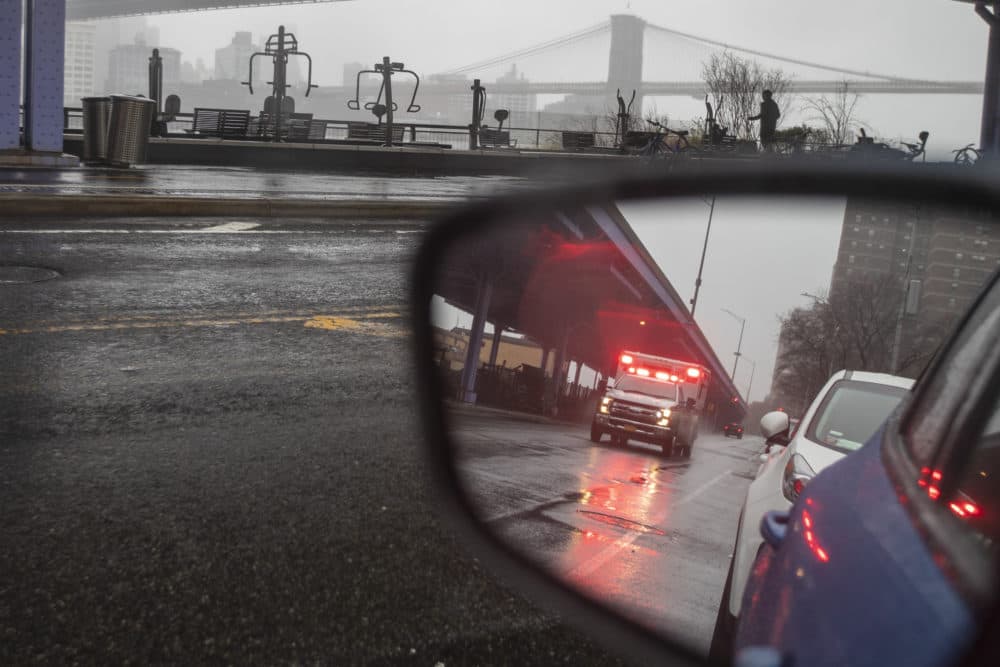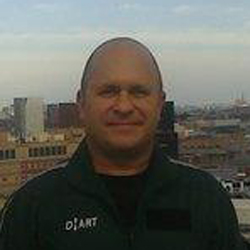Advertisement
Commentary
As Paramedics, We Know What's Coming. We Just Don't Know When

Outside, the rain has stopped, but it’s 4 a.m. on a dank Monday morning, and I wonder if the real deluge will begin today.
Coronavirus and its disease, COVID-19, are infiltrating central Massachusetts in fits and starts. A few cases here, one or two more there. The math is clear. The line will not hold. We expect to be awash in it soon.
What we don’t know is when.
We see what our colleagues in New York City are enduring, where the nightmare scenario of tabletop trainings and emergency medical services (EMS) bull sessions over the years has arrived for them in Technicolor horror.
The math is clear. The line will not hold. We expect to be awash in it soon.
Even here, we see the start of it. This past week, a well-liked and veteran ER nurse I know found himself in the intensive care unit (ICU), battling to catch his breath and stay off the ventilator.
We wonder: how many of us will follow?
This is a unique time to be a paramedic or an emergency medical technician (EMT) in America. The word “unprecedented” fails to capture exactly how uncharted the waters we’re navigating really are. What kind of crisis is it — existential, to be sure, but that’s not the whole of it — when the profession didn’t even exist the last time something of this magnitude hit?
Paramedics and EMTs are figuring out how to handle this without the comfort and advantage of past experience to draw upon. We are quite literally making it up as we go.
First responders are forced to live a professional uncertainty not seen since the days when competing ambulance services charged out of their bases in funeral homes in souped-up Cadillac Imperials, racing one another to get to the sick and injured. Thankfully, the federal government imposed order in the early 1970s, creating the 911 and EMS systems on which we’ve all come to rely.
Advertisement
The job is changing wholesale almost by the minute. I don’t think the scope of the tectonic plate shifting beneath our boots can be overstated. Much like its cousin the fire service, EMS in its short life has become hidebound to certain ways of doing things, governed by protocols and practices that are inviolable, even if they don’t always seem to make sense.
In the crisis, though, we’ve discovered a kind of freedom, one that does away completely with anything we did just because “that’s the way we’ve always done it.”
These days, if it’s not safe and if it doesn’t help the patient — it goes. For example, for patients with non-medical complaints, in order to reduce close contact, we are no longer forced to carry everyone. There is even a protocol for suggesting to the patient a once unutterable idea: that maybe transport isn’t necessary at all.
On a daily basis, our leaders, locally and in Boston, confronted with an enemy both invisible and against which we have meager defenses, is smartly throwing out whole portions of the playbook, focusing solely on the practices that are best for the patient and the providers.
But of course, this is a war, and in war, there is no way to guarantee everyone’s safety.
And yet…
I have heard paramedics and EMTs worried about what they might bring home to their families, or to loved ones with compromised immune systems or underlying medical problems. Most cruelly, I’ve heard EMTs at private ambulance companies worried for their jobs, as they see hours scaled back as non-emergent transports have dwindled to a trickle and their employers tighten belts. There is talk even of layoffs, which seems like a bizarre Pynchonian twist in an already bizarre time.
What haven’t I heard?
Quit.
Run.
Hide.
Not the young EMT mother of two toddlers I know, who worries what she might bring home but goes to work regardless.
Not the aspiring paramedic in my class who has a sick child.
Not the 22-year-old EMT I talked to last night, who hasn’t been home in two weeks while banking money before losing his overtime, or even his job.
For EMS, the pandemic is, in some ways, just another day at the office.
There are thousands just like them.
Despite all this, there is a comforting familiarity to the crisis.
For EMS, the pandemic is, in some ways, just another day at the office.
We are adept at facing invisible adversaries with a limited toolbox, making do with scarce supplies in less-than-ideal conditions, guessing who’s a threat to us and who is not.
So while this is novel territory, we are uniquely prepared. As Winston Churchill said, we are “bracing ourselves for our duty,” and I suspect, when all is said and done, this crisis will be our finest hour.
